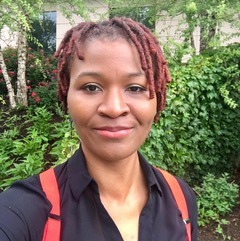There was a time where when someone said, “Tell me about yourself” and I responded with a variation of “I’m gifted” or “because of giftedness.” That time, naturally, was when I had just discovered that lens. Suddenly, it seemed to explain everything about me. It seemed relevant to everything and everyone.
But as I’d learn through some awkward experiences, this was not the case.
Trying on the Usual Labels
I began my self-exploration journey feeling insecure about my overall sense of identity—until I encountered the word gifted. This catch-all word was often accompanied by long lists of sometimes conflicting qualities that seemed to describe parts of my essence. You know the words:
Quirky. Creative.
Deeply Sensitive.
Lonely.
Yes, I was some of those things, especially lonely. I felt comforted when cloaked with this identity and allowed it to fill the frustrating gaps in my self-knowledge. Looking back, I see now that I expected all the complexities and inconsistencies in my identity to be adequately answered with “because I’m gifted.” I could hide behind it. I could even disappear there forever if I wanted.
Casting those unresolved threads aside, I wanted to meet other gifted people. My premise was that everyone who was gifted would instantly understand everything about me. If this vague, nebulous label described me (even if I struggle to define it), then, I concluded, I would get along swimmingly with everyone else it described.
As you may have guessed, I encountered some challenges.
The Gifted Adults Meetup
I launched my effort to find my people by establishing a local group for Gifted Adults on Meetup.com. I fancied myself to be like Professor X in X-Men, entrusted with finding all the exiled mutants. Then we would work, play, and love harmoniously within our special society, excluding all others.
I held the weekly meeting at a sophisticated tea house. No one showed the first few times. As I sat there alone, waiting, I patiently sipped my matcha tea, fantasizing about those magic connections. About meeting those kindred spirits who would understand everything about me instantly because they were also gifted. I realized I couldn’t envision precisely who I expected to show up, but I imagined we would all be quirky, curious, feel out of place, and feel emotions deeply. And those would be my people.
As I sat there alone, waiting, I patiently sipped my matcha tea, fantasizing about meeting those kindred spirits who would understand everything about me instantly because they were also gifted.

And then, finally, at my fourth meetup, someone showed! A tall woman dressed in business casual attire approached my table, asking if this was the gifted adults meetup. She was an attorney with a pragmatic, no-nonsense vibe. As we talked, I learned that she was passionate about advocating for child welfare and knitting. I wasn’t interested. I wanted only to talk about giftedness and see if she matched up with my trait list.
She prompted me to share a little about myself. My response was that “I was gifted and interested in meeting other gifted people.” I felt that should be enough to pique her interest—maybe even impress her. Her delayed response, however, informed me that my answer was severely lacking. Later I would understand that this answer revealed none of the substance necessary to build meaningful conversation, let alone a lasting connection.
The conversation briefly faltered until she responded, “Okay. Well, I was identified as gifted in school, but who cares? I don’t consider it much anymore. It’s just a tongue-in-cheek thing for me now.”
I felt wounded when she described the concept that I was hanging my entire identity upon as “tongue-in-cheek.” How was this not the most important part of her identity?! How could she find belonging without it?
And honestly, she didn’t seem “quirky” at all. Instead, she appeared grounded and sharp. I interrupted her during a story about an especially challenging child advocacy experience to ask, “So, do you experience feelings more deeply than others?”
Her lip curled slightly. Her response was nettled. “I mean, I guess…I don’t know. I just live my life!”
I quickly concluded that she could not be gifted. She didn’t match my traits list. Besides, all she wanted to share was her life, passions, and career—nothing about the experience of being gifted. She didn’t sound like an exiled mutant, struggling through life. So she could not be in my special society.
Just What Are People Hearing From Me?!
Fortunately, at the next week’s meetup, I had another guest! This time, I met an enthusiastic middle-aged woman who was passionate about animals, crystals, vibrations, and the connectivity of the universe. Before seating she confirmed, with an intense sparkle in her eye, that she was definitely gifted.
She hugged me and cried during our meeting—yeah, this was more like it. She was quirky and creative and shared that she often felt out of place.
And yet, as the conversation progressed, it was clear that we were still very different. I struggled to find common ground between us but waited for the magic link that I still expected would happen between two gifted people.
Then it came out: It turned out she believed I meant “gifted” as having spiritual or clairvoyant powers. Oh no! Through a pretty lengthy conversation, we were both using the same word, but meaning different things by it. That’s when it struck me that maybe the word “gifted” wasn’t a reliable concept to build my entire identity around.
We were both using the same word, but meaning different things by it. That’s when it struck me that maybe the word “gifted” wasn’t a reliable concept to build my entire identity around.
The Missing Piece of the Puzzle
I reflected on my experiences so far. The first woman I met didn’t build her identity around the word gifted, yet she was a stable, complete person with passions, interests, and goals. In the second meeting, I met someone using the same word as me but meaning something totally different. That wasn’t good either. What was I doing wrong?
Maybe it was time to explore those uncomfortable missing pieces of self-knowledge that I was using “gifted” to fill in. What were my own unique strengths, interests, passions, and goals? What specific qualities was I seeking in a friend? What if I took time to look inward and share specific ideas with people when they asked, “Tell me about yourself”? Could that conversation possibly be more engaging than describing myself through a one-dimensional lens?
By this point, I was ready to give up—but I decided to return to the tea house one more time. That was when Jessie, the editor-in-chief of Third Factor, walked in.
And this time, something different happened. For starters, she was really into tea—and so am I! I love tea. Come to think of it, that’s why I held the meetings at a tea shop. We had both lived abroad, so we connected over those experiences. I enjoyed learning about Jessie’s interests, and in turn, I enjoyed sharing specific information about myself beyond the vague and nebulous “I’m gifted, so match yourself to this list” game.

We briefly talked about giftedness, but suddenly, that felt irrelevant in comparison to me sharing who I am as a whole person and finding common ground that way.
The Path to Friendship
Jessie and I have been friends ever since.
Where originally I sought to match a pre-made list of traits I found on the Internet, I realized through this effort that what I really needed to do was determine which traits were valuable to me—and then search for those. Where originally I said, “I want only gifted friends,” I came to determine that I want friends who are kind, intellectually curious, open-minded, passionate, authentic, and stable. And I had more success seeking and finding that.
That was when I decided to close down the Gifted Adults Meetup. Yes, I had met one friend there, and yes, we talked a little bit about our experiences of being “gifted” and how that affected us. But it also meant something that the hit rate for the group overall was so low—and that in the one case where I actually had a hit, we had moved on quickly from the topic of giftedness.
So I fell short of my grandiose goal of uniting all gifted people in an exclusive society, but I do have great friends. Are the friends and romantic partners I’m closest to now gifted? I can’t be sure…nor is it important. There is little space for the concept of giftedness during engaging conversations with people who share values and interests. There is little need for this vague concept for people, as my attorney attendee demonstrated, who are “just living their lives.”
Are the friends and romantic partners I’m closest to now gifted? I can’t be sure…nor is it important.
“Gifted” served as a life preserver during a time of identity insecurity, but it was only the beginning of a lifelong journey to further self-knowledge. As I gained confidence and developed a stronger sense of self, the period where I needed to cling to the word “gifted” as a catch-all explanation of identity, personality, and belonging came to a close. From where I am now, providing the answer, “I’m gifted” to a question asking about who I am as a complex, unique individual feels just as strange as answering “Why is the sky blue?” with “Because it’s gifted.”




